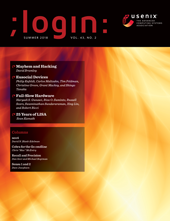
A Quarter Century of LISA (with Apologies to Peter Salus)
;login: Enters a New Phase of Its Evolution
For over 20 years, ;login: has been a print magazine with a digital version; in the two decades previous, it was USENIX’s newsletter, UNIX News. Since its inception 45 years ago, it has served as a medium through which the USENIX community learns about useful tools, research, and events from one another. Beginning in 2021, ;login: will no longer be the formally published print magazine as we’ve known it most recently, but rather reimagined as a digital publication with increased opportunities for interactivity among authors and readers.
Since USENIX became an open access publisher of papers in 2008, ;login: has remained our only content behind a membership paywall. In keeping with our commitment to open access, all ;login: content will be open to everyone when we make this change. However, only USENIX members at the sustainer level or higher, as well as student members, will have exclusive access to the interactivity options. Rik Farrow, the current editor of the magazine, will continue to provide leadership for the overall content offered in ;login:, which will be released via our website on a regular basis throughout the year.
As we plan to launch this new format, we are forming an editorial committee of volunteers from throughout the USENIX community to curate content, meaning that this will be a formally peer-reviewed publication. This new model will increase opportunities for the community to contribute to ;login: and engage with its content. In addition to written articles, we are open to other ideas of what you might want to experience.

In 1992, I had just hired another sysadmin named Dan. One day he asked me about going to this conference, which I had never heard of. I’d never been to any sort of conference before and had no idea what to expect. What we found, however, was amazing. We had found our people. It seemed like everyone there was just like us, all struggling with the same things, all looking for similar solutions. In retrospect, in such a young industry, this wasn’t all that surprising. Perhaps the most surprising thing, however, was the vaunted “hallway track” and learning the backgrounds of everyone I met. I don’t actually recall meeting a single CS major. Science was well represented (I’m a physics major, and there were plenty of math, biology, chemistry, and physics majors), but in a strange twist there were also plenty of music, art, theater, literature, and all sorts of other liberal arts majors.
